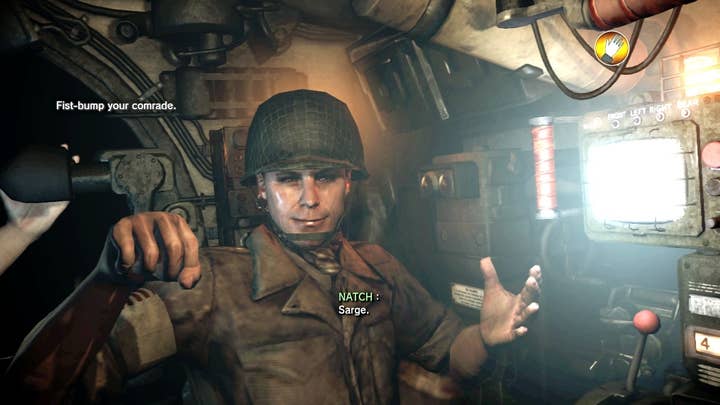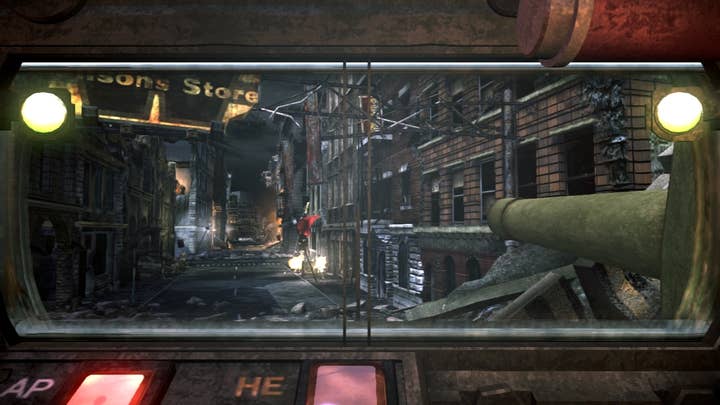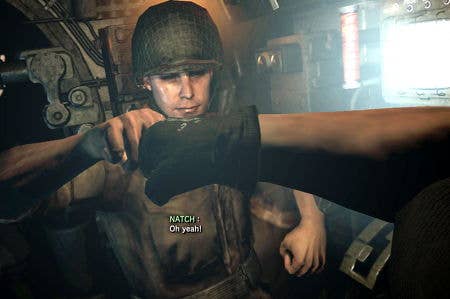Critical Consensus: Steel Battalion: Heavy Armor
The end of the line for core games on Kinect? From Software's unlikely sequel exposes the limitations of Microsoft's peripheral
For some, Steel Battalion: Heavy Armor will mark the end of the debate about Kinect's viability for core games. When Microsoft's peripheral was first unveiled at E3 in 2009 it seemed ripe with potential, but the hardware showcased on-stage and the hardware that shipped the following year were very different beasts. Since then, Microsoft has managed to sell many millions of Kinect units despite a fairly meagre selection of games that truly sell the concept, and - Child of Eden and The Gunstringer aside - virtually nothing to sate the core gamer's appetite.
In that context, Steel Battalion looked like an oasis in the desert: an unlikely sequel to a relatively obscure and ultra-hardcore Xbox game that shipped with one of the most elaborate controllers ever devised, from the talented bunch of developers responsible for the uncompromising sleeper hits Demon's Souls and Dark Souls. Hopes were high, but, for the most part, those hopes have been dashed mercilessly against the rocks.
So far, the reviews for Steel Battalion have served as a rejoinder to the widely held belief that game critics only operate in the top four points of the ten-point scale. As things stand, the only two scores at 7 or above are from the US and UK editions of the typically lenient Official Xbox Magazine, while the majority tumble from 5 right down to a virtually unheard of 1 out of 10.
"You're kept so physically and mentally engaged by Heavy Armor that the effect is one of a control or engine room simulation as much as an action game"
Edge
Strangely, the hard-marking Edge magazine isn't among Steel Battalion's harshest critics. Awarding a score of 6 out of 10, it's hardly the most complimentary review, but there's a clear admiration for From Software's commitment to conveying the lumbering difficulty of operating a Vertical Tank (VT) through its gameplay. In Edge's view Steel Battalion is, "a modern rarity: a game designed to be hard work."
"In the thick of battle, all that was simple to remember in the tutorial becomes an extreme memory test as the cabin rocks, rolls and fills with smoke. And, once your initial confusion passes, the game's use of both Kinect and a controller leads to a heightened sense of involvement. The controller feels like a navigational tool, occupying an integral part of the mech, rather than some abstract pandering to usability."
The game's stages take anywhere from 5 to 15 minutes to complete on a clean run, but the chances of completing a clean run on the first attempt are basically non-existent. As in From Software's previous games, death will occur swiftly and often, so players need to memorise every wrinkle of the control system and the way each level moves between open gameplay and scripted events.
"Some of these scripted scenes are context-specific, though, adding the illusion of improvised play, such as a crew member popping the hatch and making a dash for it. Try to drag him back in and he may come back a gibbering wreck or a corpse; let him go and you'll take heat from your crew. Such mini-events add to the tense, cluttered busyness of play: you're kept so physically and mentally engaged by Heavy Armor that the effect is one of a control or engine room simulation as much as an action game."

For Joystiq, which awarded 2 stars, the control system seems less designed for the game than it is for the limitations of the Kinect hardware. The gestural controls are kept to a handful of basic movements, and each resulting action takes a significant amount of time to complete - a great approach when it works, but Kinect's flaws capsize the experience.
"The pacing is slow, despite however hectic the battle may become outside. Rounds of ammunition take several seconds to load, meaning every shot has to count. Miss, and you're only giving enemies an opportunity for a free counter-attack as your team scrambles to reload. Hit, and you're rewarded - the rare one-shot-kill on a VT, or vaporising an entire squadron of Uncle soldiers.
"While the slow, methodical combat may add a sense of realism to the proceedings, the Kinect's shortcomings also make it feel necessary. Using nothing but gestures, it takes a long time to 1) pull away from the periscope, 2) pull out a control panel, 3) activate the ventilator, 4) put the panel away and 5) pull down the periscope again.
"Whenever the recognition is working, Kinect really does enhance the experience of Steel Battalion, enabling the fantasy of piloting a very real walking tank and delivering a thrill of satisfaction with every confirmed kill. When the tech fails, however, at least in my experience, it fails in such a fundamental way that it's impossible to ignore."
"At its most fundamental level, this product simply does not work and is the worst implementation of Kinect controls I've ever experienced"
Polygon
For Polygon, Kinect's shortcomings weren't only impossible to ignore, they made the Steel Battalion impossible to review. Ultimately, it was given 1 out of 10, on the grounds that it, "failed to function in a means that properly allowed our reviewer to complete the game."
"At its most fundamental level, this product simply does not work and is the worst implementation of Kinect controls I've ever experienced... Tthe control problems I encountered were so pervasive, so detrimental, that I firmly believe there is no amount of visual, musical or narrative mastery that could make this an experience I could in any way recommend."
"I tried every living room configuration available to me, including moving aside not only my coffee table but my entire couch so I could sit upright in one of my dining room chairs at the recommended distance from my TV. Though some of my colleagues in the industry reported having a little more luck with this labour-intensive setup, none could finagle 100 percent accuracy. In my own experiment, the improvement wasn't enough to be noticeable if, indeed, there was any improvement at all.
Of course, very few, if any, Kinect games have managed to achieve 100 per cent accuracy. The difference with Steel Battalion is that its design simply doesn't work with such unreliable inputs. From Software has deliberately created an experience where every action is slow and deliberate and the wrong action often leads to immediate death. When those actions regularly don't work through no fault of your own, it breaks the game on the most fundamental level.

But Giant Bomb isn't content with laying all of the blame on Kinect. In its 1 star review, responsibility for the game's abject failure is attributed to From Software's fatally misguided approach to the design. After all, with the hardware's shortcomings so well established, what excuse can there be for releasing a game that simply won't acknowledge their existence.
"It's frustrating enough to play a game that flat-out refuses to behave properly, but in Steel Battalion's life-or-death situations, it's absolutely unforgivable that you can't always do exactly what you want to do when you want to do it. This is the sort of game where you peer through a tiny viewport that shows you only a small portion of the battlefield directly in front of you, but you can and do take fire from all sides almost constantly. It's the sort of game where moving your mech even a few steps will cause your reticle to bob up and down wildly, making it a delicate balancing act of deciding when to move and when to shoot... I've rarely felt so powerless to tackle a game's challenges as I have while playing this one, and that's not fun, at all.
"It would be easy to blame the failure of this game entirely on the unreliability of Kinect, but Steel Battalion wouldn't even be a good game of this style even if it worked properly. All of the difficulty comes from how slowly you move around the environment and how limited your ability is to identify the threats around you and defend yourself from them.
"You can decide for yourself whether you want to view this game as a blanket indictment of the Kinect as a device for playing "real" games, or merely an isolated case of this one game's execution falling far, far short of its ambitious premise. If you're trying to decide whether you should play this game, though, let me save you some trouble: don't."

